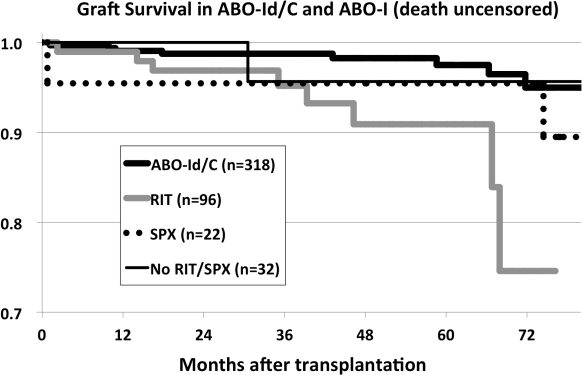Favorable Results of ABO Incompatible Renal Transplantation Without B Cell Targeted Therapy: Advantages and Disadvantages of Rituximab Pretreatment
1Nagoya Daini Red Cross Hospital, Nagoya, Japan
2Masuko Memorial Hospital, Nagoya, Japan
3Aichi Medical University, Nagakute, Japan
4Nagoya University School of Medicine, Nagoya, Japan.
Meeting: 2015 American Transplant Congress
Abstract number: 198
Keywords: Immunosuppression, Kidney transplantation
Session Information
Session Name: Concurrent Session: Kidney: Desensitization
Session Type: Concurrent Session
Date: Monday, May 4, 2015
Session Time: 2:15pm-3:45pm
 Presentation Time: 3:27pm-3:39pm
Presentation Time: 3:27pm-3:39pm
Location: Terrace I-III
INTRODUCTION
The outcome of ABO-incompatible transplantation (ABO-I) has been reported to be comparable to that of ABO-identical/compatible transplantation (ABO-Id/C), which is considered to be due to B cell targeted therapy such as rituximab (RIT). We have demonstrated cytoprotective effects (e.g., up-regulation of CD55/CD59 and down-regulation of MHC expression) of anti-A/B antibody (Ab) binding on endothelial cells. Therefore, it is suggested that beneficial result of ABO-I might be attributed to anti-A/B Ab binding rather than B cell targeted therapy.
METHODS
468 consecutive living donor renal transplants (318 ABO-Id/C and 150 ABO-I) between 2007 and 2012 were examined. We compared the outcome of ABO-I with RIT (n=96) or splenectomy: SPX (n=22) to that without RIT or SPX (no RIT/SPX: n=32). Desensitization protocol in ABO-I consisted of steroid and antimetabolites (from day -14), plasmapheresis (x2-x4) and rituximab (200mg x2), SPX or none (because of low anti-A/B Ab titer ≤ x16).
RESULTS
Death uncensored graft survival at 5 years were 97.5% in ABO-Id/C, 90.9% in RIT, 95.5% in SPX and 95.7% in no RIT/SPX.  Causes of graft failure were CVD / VAHS / rejection(4) in ABO-Id/C, CVD(2) / infection(2) / malignancy / PTLD / rejection(2) in RIT, CVD / infection(2) in SPX, and infection in no RIT/SPX. BKVAN was observed in 1% of HLA-Id/C and 4 % of RIT, but not in SPX or no RIT/SPX. Frequencies of de novo DSA were 10.3%, 4.4%, 19.0% and 3.1%, respectively.
Causes of graft failure were CVD / VAHS / rejection(4) in ABO-Id/C, CVD(2) / infection(2) / malignancy / PTLD / rejection(2) in RIT, CVD / infection(2) in SPX, and infection in no RIT/SPX. BKVAN was observed in 1% of HLA-Id/C and 4 % of RIT, but not in SPX or no RIT/SPX. Frequencies of de novo DSA were 10.3%, 4.4%, 19.0% and 3.1%, respectively.
CONCLUSIONS
ABO-I exhibited favorable graft outcome and low prevalence of de novo DSA even without B cell targeted therapy, which may result from low anti-A/B Ab titer.
In contrast, RIT treatment tended to be associated with patient death or adverse effect such as infection. If indication for no RIT/SPX can be safely extended, more favorable patient/graft survival would be anticipated.
To cite this abstract in AMA style:
Okada M, Futamura K, Itou K, Yamamoto T, Hiramitsu T, Tsujita M, Goto N, Narumi S, Watarai Y, Katayama A, Uchida K, Kobayashi T. Favorable Results of ABO Incompatible Renal Transplantation Without B Cell Targeted Therapy: Advantages and Disadvantages of Rituximab Pretreatment [abstract]. Am J Transplant. 2015; 15 (suppl 3). https://atcmeetingabstracts.com/abstract/favorable-results-of-abo-incompatible-renal-transplantation-without-b-cell-targeted-therapy-advantages-and-disadvantages-of-rituximab-pretreatment/. Accessed February 10, 2026.« Back to 2015 American Transplant Congress
